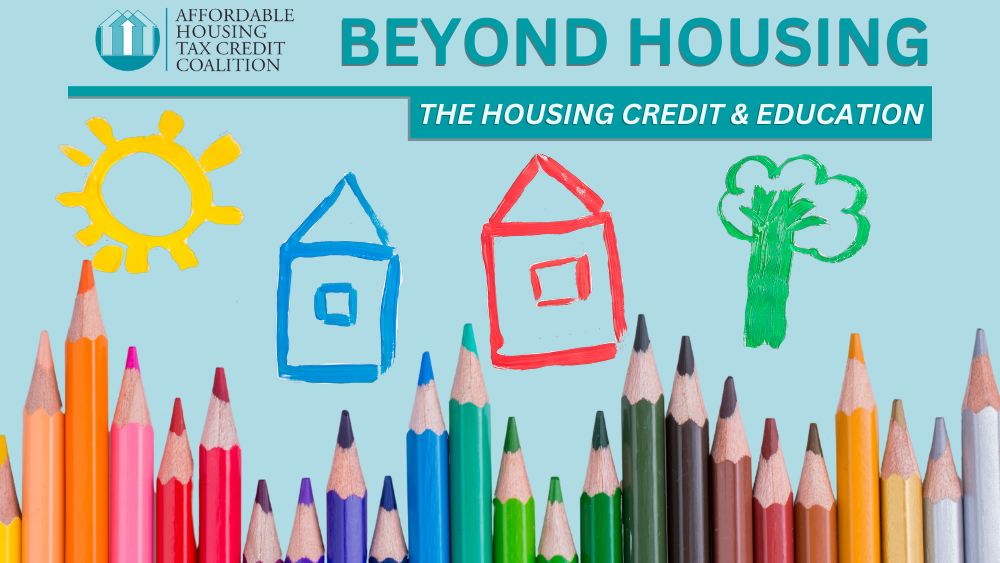When children have a safe, stable place to call home, they are more likely to stay on track in school and achieve their full academic potential. Because children develop crucial behavioral and academic skills in early and middle childhood, the added stress of an unstable living environment can have long-term detrimental effects on a child’s future. Moving three or more times during school, particularly between ages six and 10, is linked to significantly lower future wages, fewer work hours, and lower overall educational attainment.[1][2]
Research shows that school-age children who experience homelessness or move residences frequently perform worse in school than their peers. The MacArthur Foundation reported that any move during childhood is associated with nearly a half-year loss in educational attainment for children ages 6 through 10.[3] Moreover, A 2014 study of 359 children of varying demographic and family backgrounds from 42 preschools indicated that frequent residential moves between birth and preschool contributed to significantly worse scores on math and literacy assessments during the preschool year.[4] As children experiencing residential instability progress through their education, they face a variety of challenges that can exacerbate their lower academic achievement. The Department of Housing and Urban Development (HUD) found that experiencing disruptions due to increased absenteeism or switching schools at unplanned times may block students from accessing special education evaluations and other academic support services.[5]
The Low-Income Housing Tax Credit (Housing Credit) helps to address the academic achievement gap for children facing housing instability by providing families with both quality affordable housing and accessible educational resources. For example, properties such as Woods Grove Apartments in Pittsburg, CA and The Tony Lee in Seattle, WA have educational programs for preschool-age children on-site. Additionally, Village on Mercy in Orlando, FL and Reed in Houston, Texas are both Housing Credit properties who partnered with Bezos Academy to provide a tuition-free Montessori-inspired preschool on-site for residents and other community members with children ages three and four.
More generally, children also benefit from the better living conditions and increased disposable income that Housing Credit properties provide for their families. A MacArthur Foundation study in Cleveland, Ohio, established that poor living conditions exacerbate the risk for child maltreatment and health issues such as lead exposure, which both contribute to lower literacy scores and academic achievement.[6] Additionally, an article published by Health Affairs found that investment in enrichment activities for children is most beneficial and accessible when families spend 30 percent or less of their income on housing costs.[7] Lower rents at Housing Credit properties allow more families to invest in extracurricular and enrichment activities for their children, which is proven to positively impact child academic attainment and social behavior. Overall, combining direct access to early childhood educational opportunities and stable, affordable housing removes barriers to academic achievement for children in low-income families and opens opportunities for future success.
While the Housing Credit has financed more than 3.7 million safe, stable homes, the urgent demand for affordable housing vastly outweighs the currently available supply. Expanding and strengthening the Housing Credit program through the Affordable Housing Credit Improvement Act (AHCIA, S. 1557/H.R. 3238 ) would finance an additional nearly 2 million affordable homes over the next 10 years than otherwise possible. There is also a specific AHCIA provision to promote educational attainment by allowing single parents and formerly homeless youth who are enrolled full-time in higher education institutions to be eligible to live in Housing Credit properties (read more about Section 203 of the AHCIA here).
The AHCIA will also allow more properties with robust on-site services to be built throughout the country through basis boost provisions. Examples include properties like those developed by Family Scholar House, Inc to support low-income parents who need affordable housing while they work towards additional academic degrees. Research demonstrates that children with college-educated parents are more likely to enroll in and graduate from four-year universities.[8] Additionally, families without college-educated adults are more likely to be low-income, which is also linked to lower graduation rates for first-generation college students.[9] By supporting parents who seek higher education, access to Housing Credit properties can positively change the trajectory for low-income families into the future. Bolstering the Housing Credit program through the AHCIA would vastly increase the supply of affordable housing with local services for communities, relieve the burden of housing costs for American families, and contribute to ongoing economic mobility and achievement for future generations.
Written and designed by Lauren Nixon
[1] Ziol-Guest, K., & Kalil, A. (2014). Frequent moves in childhood can affect later earnings, work, and Education. MacArther Foundation: How Housing Matters. https://housingmatters.urban.org/sites/default/files/wp-content/uploads/2014/09/How-Housing-Matters-Policy-Research-Brief-Frequent-Moves-in-Childhood-Can-Affect-Later-Earnings-Work-and-Education.pdf
[2] U.S. Bureau of Labor Statistics. (2022, September 8). Education pays. U.S. Bureau of Labor Statistics. https://www.bls.gov/emp/chart-unemployment-earnings-education.htm
[3] Ziol-Guest, K., & Kalil, A. (2014). Frequent moves in childhood can affect later earnings, work, and Education. MacArther Foundation: How Housing Matters. https://housingmatters.urban.org/sites/default/files/wp-content/uploads/2014/09/How-Housing-Matters-Policy-Research-Brief-Frequent-Moves-in-Childhood-Can-Affect-Later-Earnings-Work-and-Education.pdf
[4] Schmitt, S. A., Finders, J. K., & McClelland, M. M. (2015). Residential Mobility, Inhibitory Control, and Academic Achievement in Preschool. Taylor & Francis Online. https://www.tandfonline.com/doi/full/10.1080/10409289.2015.975033
[5] HUD USER. (n.d.). Intersectionality of Youth Homelessness. EVIDENCE MATTERS Spring 2022: Transforming Knowledge Into Housing and Community Development Policy . https://www.huduser.gov/portal/sites/default/files/pdf/EM-Newsletter-Spring2022.pdf
[6] Coulton, C., Fischer, R. L., García-Cobián, F., Kim, R. S.-J., & Cho, Y. (2013). Housing crisis leaves lasting imprint on children in Cleveland. MacArthur Foundation. https://www.macfound.org/media/files/hhm_brief_-_housing_crisis_children_in_cleveland.pdf
[7] Newman, S., & Holupka, C. S. (2016). Housing affordability and children’s Cognitive Achievement. Health Affairs. https://www.healthaffairs.org/doi/10.1377/hlthaff.2016.0718
[8] Bird, G. (2018). Students’ postsecondary education arcs affected by parents’ college backgrounds, study finds. Inside Higher Ed | Higher Education News, Events and Jobs. https://www.insidehighered.com/news/2018/02/08/students-postsecondary-education-arcs-affected-parents-college-backgrounds-study
[9] Jiang, Y., Ekono, M., & Skinner, C. (2015). Basic facts about low-income children: Children Under 18 years, 2013. NCCP. http://www.nccp.org/publication/basic-facts-about-low-income-children-children-under-18-years-2013/



Comments are closed.